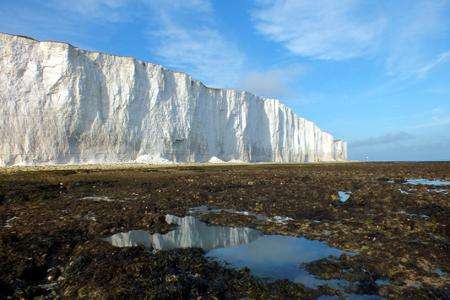November 8, 2016 report
England's white cliffs found to be eroding ten times faster over the past 150 years (Update)

(Phys.org)—A team of researchers from the U.K. and the U.S. has found that England's famed white cliffs have been eroding away 10 times faster over the past century and a half than they did in the prior 7,000 years. In their paper published in Proceedings of the National Academy of Sciences, the researchers describe how they were able to measure the rate of erosion over such a long time frame and what their findings might mean for the future of the iconic sea front.
The white coloring of the cliffs is due to the material of which they are composed—mostly chalk, which is particularly vulnerable to erosion. Prior research has suggested the cliffs were first formed approximately 90 million years ago and have been eroding ever since. But in the past, the erosion was slowed by wide beaches that helped to reflect much of the energy from wind and rain back out to sea—now, the researchers note, there is hardly any beach left at all.
To learn more about the pace of erosion on the cliffs, the researchers used a technique that involved measuring the changes in rock that occur as it is exposed to falling particles from space—more specifically, they studied an isotope of beryllium-10 that exists in the rock behind the chalk—the isotope, they note, forms and builds up in layers as the rock is struck by cosmic rays.
Their study suggested that prior to a century and a half ago, the pace of erosion was approximately two to six centimeters a year, going back approximately 7000 years. But then, starting approximately 150 years ago, things picked up and the cliffs began to see an erosion rate of approximately 22 to 32 centimeters a year. The researchers theorize the change likely came about due to the construction of sea walls and groynes, which Britains have been putting in place since Victorian times, and stronger storms pounding the coastline, possibly due to global warming. This, they add, suggests that the chalk front on the cliffs is in danger of disappearing altogether if something is not done to protect them.
More information: Martin D. Hurst et al. Recent acceleration in coastal cliff retreat rates on the south coast of Great Britain, Proceedings of the National Academy of Sciences (2016). DOI: 10.1073/pnas.1613044113
Abstract
Rising sea levels and increased storminess are expected to accelerate the erosion of soft-cliff coastlines, threatening coastal infrastructure and livelihoods. To develop predictive models of future coastal change we need fundamentally to know how rapidly coasts have been eroding in the past, and to understand the driving mechanisms of coastal change. Direct observations of cliff retreat rarely extend beyond 150 y, during which humans have significantly modified the coastal system. Cliff retreat rates are unknown in prior centuries and millennia. In this study, we derived retreat rates of chalk cliffs on the south coast of Great Britain over millennial time scales by coupling high-precision cosmogenic radionuclide geochronology and rigorous numerical modeling. Measured 10Be concentrations on rocky coastal platforms were compared with simulations of coastal evolution using a Monte Carlo approach to determine the most likely history of cliff retreat. The 10Be concentrations are consistent with retreat rates of chalk cliffs that were relatively slow (2–6 cm⋅y−1) until a few hundred years ago. Historical observations reveal that retreat rates have subsequently accelerated by an order of magnitude (22–32 cm⋅y−1). We suggest that acceleration is the result of thinning of cliff-front beaches, exacerbated by regional storminess and anthropogenic modification of the coast.
Journal information: Proceedings of the National Academy of Sciences
© 2016 Phys.org




















